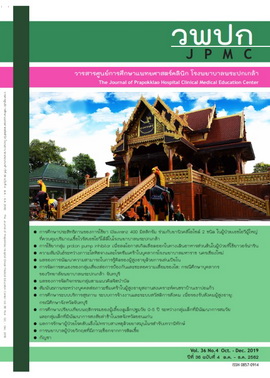Proton Pump Inhibitors to The Reduce Risk of Upper Gastrointestinal Bleeding in Patients Using Warfarin
Main Article Content
Abstract
Background: Upper gastrointestinal bleeding is one of the most common side effects among patients using anticoagulants. The combination of anticoagulants with proton pump inhibitors (PPI) has also been used in patients who appear to be at risk for upper gastrointestinal bleeding. However, evidence of efficacy for this indication is limited.
Objectives: To compare upper gastrointestinal bleeding and the major bleeding as well as side effects in other sites during anticoagulant use, with and without PPI co-therapy.
Materials and methods: This work involved a retrospective cohort study of patients who started warfarin treatment at Banglamung Hospital between 1 January 2015 and 31 December 2018.
Results: The study enrolled 207 participants comprised of 87 patients who took warfarin with omeprazole co-therapy and 120 controls. The HAS-BLED score did not differ between the two groups. In terms of omeprazole co-therapy, the ratios for upper gastrointestinal tract bleeding (UGIB), non-UGIB major bleeding, and death were 9.2%, 10.3%, and 14.9%, respectively, while those of the control group were 5%, 5.8%, and 9.2%, respectively. The hazard ratios were 2.07 (95%Confidence interval [CI] 0.71-6.03, P 0.18) for UGIB, 1.83 (95%CI 0.68-4.93, P 0.23) for non-UGIB major bleeding, and 1.65 (95%CI 0.74-3.67, P 0.22) for death.
Conclusion: There was no significant reduction in UGIB or non-UGIB major bleeding in patients with warfarin and omeprazole co-therapy when compared with control.
Article Details
References
Landefeld CS, Beyth RJ. Anticoagulant-related bleeding: clinical epidemiology, prediction, and prevention. Am J Medicine 1993; 95: 315-28.
Forfar JC. A 7-year analysis of haemorrhage in patients on long-term anticoagulant treatment. Br Heart J 1979; 42: 128–32.
Olsson SB. Stroke prevention with the oral direct thrombin inhibitor ximelagatran compared with warfarin in patients with non-valvular atrial fibrillation (SPORTIF III): randomised controlled trial. Lancet 2003; 362(9397): 1691–8.
Connolly SJ, Ezekowitz MD, Yusuf S, , Eikelboom J, Oldgren J, Parekh A, et al. Dabigatran versus warfarin in patients with atrial fibrillation. N Engl J Med 2009; 361: 1139–51.
Granger CB, Alexander JH, McMurray JJ, Lopes RD, Hylek EM, Hanna M, et al. Apixaban versus warfarin in patients with atrial fibrillation. N Engl J Med 2011;365:981-92.
Patel MR, Mahaffey KW, Garg J,Pan G, Singer DE, Hacke W, et al. Rivaroxaban versus warfarin in nonvalvular atrial fibrillation. N Engl J Med 2011; 10: 1–5.
Chen WC, Chen YH, Hsu PI, Tsay FW, Chan HH,Cheng JS, et al. Gastrointestinal hemorrhage in warfarin anticoagulated patients: incidence, risk factor, management, and outcome. Biomed ResInt[Internet].2014[ cited 2019 Feb 4];463767. Available from: https://downloads.hindawi.com/journals/bmri/2014/463767.pdf
Thomopoulos KC, Mimidis KP,Theocharis GJ,Gatopoulou AG,Kartalis GN, Nikolopoulou VN. Acute upper gastrointestinal bleeding in patients on long-term oral anticoagulation therapy: endoscopic findings, clinical management and outcome. World J Gastroenterol 2005; 11: 1365–8.
Brunner G, Creutfeldt W. Omeprazole in the long-term treatment of patients with acid-related disease resistant to ranitidine. Scand J GastroenterolSuppl 1989; 166: 101–5.
January CT, Wann LS, Alpert JS, Calkins H, Cigarroa JE, Cleveland JC Jr, et al. 2014 AHA/ACC/HRS guideline for the management of patients with atrial fibrillation: a report of the american college of cardiology/american heart association task force on practice guidelines and the heart rhythm society. J Am CollCardiol 2014; 64:1–76.
Kearon C, Akl EA, Comerota AJ, Blaivas A, Jimenez D, Bounameaux H, et al. Antithrombotic therapy for VTE disease: Antithrombotic Therapy and Prevention of Thrombosis, 9th ed: American College of Chest Physicians Evidence-Based Clinical Practice Guidelines. Chest 2012; 141(2 Suppl): e419S–96S.
Kirchhof P, Benussi S, Kotecha D, Ahlsson A, Atar D, Casadei B, et al. 2016 ESC Guidelines for the management of atrial fibrillation developed in collaboration with EACTS. Eur Heart J 2016; 37: 2893–962.
Henriksen DP, Stage TB, Hansen MR, Rasmussen L, Damkier P, Pottegard A. The potential drug–drug interaction between proton pump inhibitors and warfarin. Phamacoepidemiol drug saf 2015; 24: 1337-40.
Ray WA, Chung CP, Murray KT, Smalley WE,Daugherty JR,Dupont WD, et al. Association of proton pump inhibitors with reduced risk of warfarin-related serious upper gastrointestinal bleeding. Gastroenterology 2016; 151: 1105–12.
Ray WA, Chung CP, Murray KT, Smalley WE,Daugherty JR,Dupont WD, et al.Association of oral anticoagulants and proton pump inhibitor cotherapy with hospitalization for upper gastrointestinal tract bleeding. JAMA 2018;320:2221-30.
Lin KJ , Hernández-Díaz S , García Rodríguez LA. Acid suppressants reduce risk of gastrointestinal bleeding in patients on antithrombotic or anti-inflammatory therapy. Gastroenterology 2011; 141: 71-9.
Caldeira D, Cruz I, Morgado G, Stuart B, Gomes AC, Martins C, et al. Is the time in therapeutic range using the ratio of tests equivalent to the Rosendaal method. Blood CoagulFibrinolysis 2015; 26: 972–6.
Schulman S, Kearon C. Definition of major bleeding in clinical investigations of antihemostatic medicinal products in non-surgical patients. J ThrombHaemost 2005; 3: 692-4.
Zhu W, He W, Guo L, Wang X, Hong K. The HAS-BLED Score for predicting major bleeding risk in anticoagulated patients with atrial fibrillation: a systematic review and meta-analysis. ClinCardiol 2015; 38: 555–61.

